LANGUE

Lourdes Myah Anglade • Dec 3, 2024

(Parujee Akarasewi/CHUO)
This month saw the third annual Cranium Recognized Awards, a staple event that celebrates the achievements and contributions within Ottawa’s vibrant music and arts scene. This event, an integral part of the Cranium Arts Project, highlights the diversity, talent, and creativity that defines Ottawa’s cultural fabric.
The Cranium Arts Project is committed to elevating artists and fostering professional development, networking, and learning opportunities. Through its awards, it recognizes outstanding individuals and projects across genres and disciplines rooted in Black culture, including Hip-Hop, R&B, Dancehall, and EDM.
This year’s winners represent a remarkable array of talent:
Rising Star: Jev
DJ of the Year: DJ Kayen
Song of the Year: City Fidelia
Foundation Prize of the Year: Caption, the Origin Arts Project
Performer of the Year: Shim in the Cut
Video of the Year: Outside by Banggz, directed by Kishan Sandagar
The evening showcased not only the awards but also electrifying performances. Banggz opened the show with a dynamic set that set the tone for the night, followed by captivating acts from FRMULA and Taapz. CHUO member Parujee Akarasewi states that each performance was captivating, their performances highlighted the depth of Ottawa’s artistic community and its growing influence on a national and international scale.
Hosted by the charismatic Rose Ingrid, the event exuded energy, excitement, and camaraderie. The Cranium Recognized Awards continue to serve as a beacon for the arts in Ottawa, providing a platform for creatives to shine and inspiring the next generation of talent.
For more information about the Cranium Arts Project, visit their website: https://craniumfestival.com
The CHUO team looks forward to next year’s celebration of artistry and innovation, as the city’s cultural scene continues to thrive and evolve.
Cranium’s Recognize Awards 2024
Dec 3, 2024 • Lourdes Myah Anglade

Vuk Cvetanovic • 30 Nov, 2024
L’émission ‘’ D’un extrême à l’autre’’ sur les ondes de CHUO 89.1, qui portait sur une variété de styles musicaux de l’industriel à la musique d’ambiance, à vu sa dernière diffusion à la fin de novembre, une mois après la mort malheureuse de son animateur Gilbert Lachance, aussi connu comme DJ Gozz.
Promoteur, DJ, et animateur radio, Gilbert à été un des membres les plus proéminents de la scène artistique ‘’underground’’ de la capitale nationale, et offrait ses services à une variété de stations en tant qu’animateur. Avec un style décontracté mais passionné, DJ Gozz à ravi les auditeurs de la ville et au-delà possèdent des oreilles aventures, et à soutenu de nombreux groupes en herbe dans la ville en diffusant leurs pièces.

(Café Dekcuf\Release the Bats)
Comme le témoigne Parujee ‘’Mickey’’ Akarasewi, cheffe de la station CHUO 89.1, Gilbert était un collaborateur enthousiaste et fidèle, et de nombreux témoins ont cité sa passion énorme pour la musique de toutes sortes.Diffusé chaque lundi à minuit jusqu’à 3 heures du matin, l’émission à pu trouver une place unique dans le répertoire d’émissions de la station comme étant pour les vrais mordus de la musique underground.
La station à ainsi décidé, après une longue réflexion, de donner à ces auditeurs un dernier mois de cette émission bien-aimée.
Pour plus de 10 ans, DJ Gozz à travaillé à élargir les frontières musicales des auditeurs de l’émission, avec ces sensibilités diverses assurant un environnement sonore d’une grande portée,
Une commémoration en son honneur était organisée fin d’octobre durant l’événement Release the Bats au café Dekcuf sur la rue Rideau, et à vu une foule se présenter pour commémorer un homme qui était non seulement un proche, mais bien un pilier de la communauté, avec lequel la vie semble bien plus fade.

(D’un extrême à l’autre\CHUO)
Avec une scène musicale en pleine croissance, la communauté artistique d’Ottawa n’oubliera pas DJ Gozz, qui à travaillé sans arrêt depuis les années 1980 pour assurer le fleurissement continu des artistes quel que soit leur origine ou style musical.
Les auditeurs peuvent écouter les enregistrements de l’émission sur demande sur le site web de la station radio CHUO en suivant ce lien.
D’un extrême à l’autre – l’émission bien-aimé de DJ Gozz prend fin sur les ondes de CHUO
Nov 30, 2024 • Vuk Cvetanovic
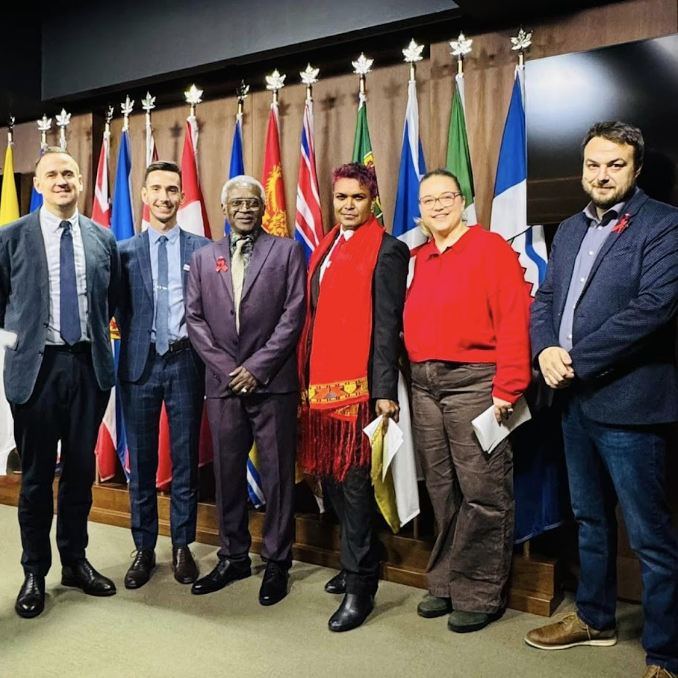
PARUJEE AKARASEWI • NOV 28, 2024
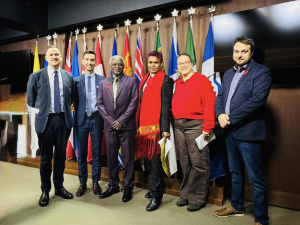
On this World AIDS Day, it’s with a heavy heart that we address Canada’s continued failure to reform its criminal laws surrounding HIV non-disclosure. Despite years of advocacy, collaboration, and promises from the federal government, those living with HIV remain subject to unjust criminalization, perpetuating stigma, fear, and harm.
The land we stand on belongs to the unceded and unsurrendered territory of the Anishinaabe Algonquin people. This acknowledgment underscores the broader injustices we seek to address, including the systematic marginalization of people living with HIV.
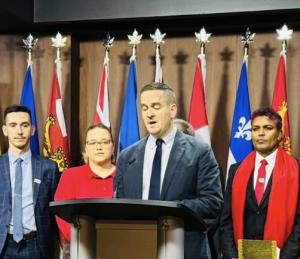
Alexander McClelland, the chair of the Steering Committee of the Canadian
Coalition to Reform HIV Criminalization (Parujee Akarasewi/CHUO)
Canada’s Global Reputation
Canada holds the shameful distinction of being a global leader in prosecuting people living with HIV for non-disclosure, with over 225 cases since 1989. These prosecutions often rely on sexual assault laws, even in cases where there was no intent to harm, no significant risk of transmission, or precautions were taken. Despite revolutionary advancements in HIV science and widespread international consensus against such criminalization, the government has failed to act meaningfully.
In 2018, the federal government acknowledged the “over-criminalization” of HIV non-disclosure, implementing a directive limiting such prosecutions in federal jurisdictions. Yet, this action was limited to the territories and failed to extend to provinces where the majority of prosecutions occur. Subsequent consultations and reports reinforced the need for reform, but no substantive legislative changes have followed.
This year, the government informed advocates that there is “no longer a path forward” for reform before the next federal election in 2025. This decision is a devastating betrayal to the 65,000 people living with HIV in Canada, who continue to live under the threat of prosecution.
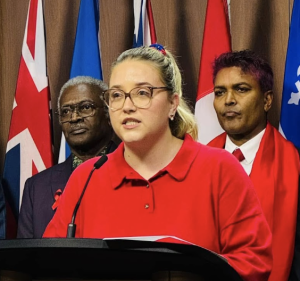
Katarina Bogosavljevic, PhD candidate at the University of Ottawa, and a steering committee member of the Canadian Coalition to Reform HIV Criminalization (Parujee Akarasewi/CHUO)
The Real Impact of Criminalization
HIV criminalization disproportionately harms marginalized communities, particularly Black and Indigenous people, and those without Canadian citizenship, who face harsh sentences, stigma, and even deportation. Criminalization fosters a climate of fear, discouraging people from getting tested or accessing treatment that could make them undetectable and untransmittable.
For those convicted, the consequences are severe and lifelong. Individuals are often placed on sex offender registries, facing job loss, social isolation, and ongoing surveillance. These punitive measures have no basis in science and undermine public health efforts.
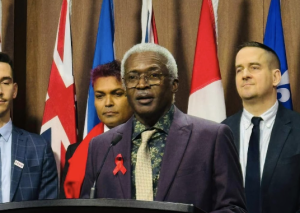
Colin Johnson, member of the Canadian Coalition to Reform HIV Criminalization, and Co-Chair of the Toronto Harm Reduction Alliance (Parujee Akarasewi/CHUO)
As Colin Johnson, a member of the Canadian Coalition to Reform HIV Criminalization, notes, “The law perpetuates racism, discrimination, and fear. It punishes people for their health rather than supporting them.”
A Personal Story
Chris Tooriram, an HIV advocate living with the virus for 25 years, shares his harrowing experience. Over two decades ago, he was charged with aggravated sexual assault for kissing someone—a situation that posed zero risk of transmission. After disclosing his status, he was brutally attacked. Despite the science, he faced criminal charges while his attacker walked free.
Stories like Chris’s highlight the cruelty of Canada’s laws. They also show why many people fear disclosure, testing, and treatment, exacerbating the very issues these laws claim to address.

Khrishna Desmond Florecita Turiram, MSM Ethno-Cultural Resource Coordinator
AIDS Committee of Ottawa (Parujee Akarasewi/CHUO)
What Needs to Change
The Canadian Coalition to Reform HIV Criminalization has worked tirelessly to propose evidence-based solutions. In 2022, the coalition developed a Community Consensus Statement calling for HIV criminalization to be a last resort, limited to cases of intentional and actual transmission.
Advocates demand: Removing HIV non-disclosure from sexual assault law, ensuring laws align with scientific evidence about transmission risks, and consistent legal standards across provinces to provide clarity and certainty for people living with HIV.
Even feminist organizations and legal experts support removing HIV non-disclosure from sexual assault law, recognizing its inappropriate use and the stigma it perpetuates.
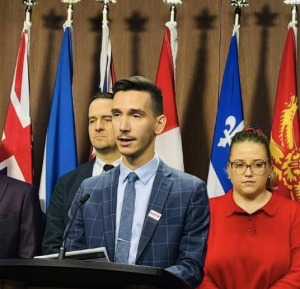
André Capretti, a lawyer and a Policy Analyst at the HIV Legal Network, and member of the Coalition (Parujee Akarasewi/CHUO)
The Government’s Failure
The government’s inaction contradicts its commitments. Prime Minister Justin Trudeau himself acknowledged the harm of these laws, stating last year that they “over-criminalize and stigmatize people living with HIV.” International bodies like UNAIDS have also repeatedly urged Canada to change its approach.
Yet, despite years of consultations, reports, and promises, the government has abandoned reform efforts. This decision tells people living with HIV that their rights and lives are secondary.
Moving Forward
This is not the end. The Coalition remains steadfast in its fight for justice, human rights, and evidence-based policies. People living with HIV are resilient, and the movement to end criminalization will continue.
HIV is not a crime. It is time Canada starts acting like it.
Canada’s Ongoing Failure to End HIV Criminalization
Nov 28, 2024 • Parujee Akarasewi

Lauren Roulston • Nov 27, 2024

(Phil Hearing/Unsplash)
LAUREN ROULSTON: I’ve seen you write about these ‘ghost bikes’ in front of city hall. To start this conversation, can you tell me a little bit about those ghost bikes and and what they mean?
ARIEL TROSTER: Sure. When the community puts up a ghost bike, it’s always a very sad time. It means that somebody, it means that somebody died as a result of, of road violence.
So, you know, several years ago, there was a woman who was killed when she was hit by a truck at the corner of Lyon and Laurier. There was somebody who was killed right in front of city hall at the corner of Laurier and Elgin. And the two bikes we put up were for two other people who lost their lives in the last couple of months related to road violence.
It’s something that came out of the grassroots community, and it’s a reminder to all of us that we need to do better. We need to get to what is called ‘Vision 0,’ which is a vision where 0 people are killed on the roads and that we have safe roads for everyone, no matter how they get around.
LR: And I’m sure you’ve got some ideas on how we get to vision 0 on how we can achieve road safety. I kind of want to talk a little bit about the Day of Remembrance for Road Traffic Victims for a second. It’s- it’s kind of hand in hand with this goal that was put out, a UN resolution actually, to meet a target by 2030 that we’ve reduced 50 per cent of road casualties. So do you think that that’s doable in Ottawa? And how would we achieve that?
AT: I think it’s doable if the province stays out of our way and lets us implement complete streets. I have a lot of concern about this bill that’s in front of the Ontario legislature right now, which would actually add more red tape and make it much more complicated to add a bike lane on a road that, where it would involve removing lane of car traffic.
The Ford government, it seems, has a particular obsession with a couple of bike lanes in Toronto that they don’t like. And, of course, without any evidence, they claim that adding cycling lanes increases traffic. The evidence shows that’s actually the opposite. It’s untrue.
When we get more people walking and cycling and taking the bus, it reduces traffic. So if you do need to use your car, you’re not stuck. And we have a transportation master plan that was put together after extensive consultation with the community. Usually, when we put in a bike lane, it’s because there’s been a demand from the community or there’s been someone hurt near there.
So I believe that as a city, we have really ambitious goals. If the other levels of government help us achieve those goals instead of getting in our way, I absolutely believe it’s achievable. But it is kind of a tough time right now to see the backlash against what are actually road safety mechanisms. You don’t have to ride a bike to want to have a safer street for everyone, including people who ride bikes. So we can avoid tragic accidents through better road design, and I hope we can continue to do that.
LR: Mhmm. So these provincial legislations specifically like Bill 212, would you call it like a setback in terms of meeting this goal for this road casualty reduction?
AT: Well, absolutely. If the, if the provincial government does what it’s threatening to do. I mean, since then the Premier said he’s not especially worried about Toronto.
If anything, it’ll delay things and make us have to justify them further. Another example is in June 2023, we had a large crowd of people that gathered at the corner of Gladstone Rochester after there was a horrendous accident where a woman almost died. And the mother of a young man who died 20 years before at the exact same intersection came to that rally. And that’s part of how we were able to kick start the process for doing a feasibility study into potential bike lanes for Gladstone.
You know, we’re not doing this because it’s a pet project. We’re doing it because we wanna make people safer. We wanna have safer roads for everyone. And because this is what the community is demanding of us. Municipal government, we’re the closest level of government to the people to where they live.
We live in the same communities, and so it’s frustrating to think that with something like Bill 212, we could do all that work and be ready to hit go and send project out to tender and have to have it sit on a provincial transportation minister’s desk for an unknown period of time to have someone who knows absolutely nothing about local realities say yes or no.
So that is very, very frustrating, and that’s why, more than half of Ottawa city councilors have signed an open letter that my office put together opposing this legislation, we have more than 2,000 signatures. Bike Ottawa also has a petition. I know the Toronto Cycling Community has a petition.
You know, I think we have to keep raising our voices because we’re not gonna get safer roads without some pretty drastic action in terms of how we design our city.
LR: Right. And, and on that, an interesting note is that I actually found in the UN that, they’ve reported that road traffic injuries are the leading killer globally of people ages 5 to 29. And I’m sure that that fluctuates with things that are going on in the world.
But the burden is disproportionately on pedestrians and cyclists and motorcyclists. So taking up this, like bike infrastructure to put up more lanes. What does that say about our ability to reduce road casualties to you?
AT: Oh, it puts it at risk, right? Like you have your hardcore cyclists, but if you want the average person, especially, I mean, I remember the experience of having my baby on the back of my bike. It’s really terrifying if you’re not in a protective lane. You know, you can’t see what’s behind you. There’s lots of times where there’s certain routes I didn’t take or where I elected to drive instead because I just didn’t feel that it was safe to cycle with my baby.
I heard from families when I was knocking on doors during the election, who had bought bike racks for their car so they can drive their car to the canal and be able to safely cycle. We live within one kilometer of the canal, it’s completely absurd. But if people don’t feel like they can get from here to there, they’re gonna choose other options.
So we do have some wonderful cycle lanes in Ottawa that are geared towards recreation, but there’s a lot of us that use our bikes as transportation. This is not glamorous stuff. This is like going to work, going to school, taking your kids places, and we need to be able to do those things if we wanna have a fundamental modal shift.
And there’s also the climate change considerations. Transportation is the number one source of emissions in Ontario. When we have more balanced roads, we reduce GHG emissions, you know, and we’re nowhere we know we’re in the midst of a climate emergency. So it’s really a win-win. I mean, having, complete streets reduces traffic, makes people safer, and it’s better for the environment.
So to me, it’s a no brainer.
LR: Mhmm. And you’ve mentioned before that, you know, bill 212, it’s kind of known as the “Reducing Gridlock and Saving You Time Act,” but you’ve mentioned that the studies point to it won’t actually help traffic.
AT: It won’t do either of those things. I mean the title of that bill is pure political propaganda. I mean, it will not save you time. It will not reduce gridlock. It will not make streets safer, and it will not be good for the environment.
LR: So, do you have a sense of what the general consensus is within city council? You’ve mentioned that there’s this petition, but what do you feel that Ottawa City Council’s stance on Bill 212 is?
AT: I mean, the vast majority of us oppose it. I mean, I think there are others who might be remaining silent for other reasons. We’re also in the process of trying to negotiate a significant amount of funding where we have a major deficit with the transit system. So I understand why people may have been a little bit careful, but, I mean, we had two pretty hastily organized rallies with really large attendants. We’ve had, I think, 13 or 14 city councilors sign on to the letter that I put out.
I think there’s a lot of energy to oppose this bill, but I think there’s also a lot of fear of retribution from the province. So, you know, we’re in a very tricky position as a municipality because technically speaking, we’re still a creature of the province. So they can come in and legislate and there’s very little we can do except raise our voices and talk about what’s important.
LR: Right. And so I guess the Premier specifically mentioned the O’Connor bike lane in Ottawa. Is that, like, at risk right now in these discussions?
AT: So they did mention it in the announcement, which was a cause for concern, but then apparently, Doug Ford said he’s not worried about Ottawa traffic. I mean, the O’Connor bike lane has had hundreds of thousands of uses since it was open.
You know, the problem is from a bird’s eye view, you might look and say, well, all the cars are stuck in traffic, and there’s only a handful of bikes. That’s because bikes are smaller.
They move more efficiently. If you do a proper count, you’ll see that that lane is used extensively. I use it to get home from work every day.
We need safe lanes on roads that people actually use, and sometimes those are roads where there are cars. And we’ve invested millions of dollars in that lane, including extra safety improvements in the last year.
So the idea of spending taxpayer money to rip up existing infrastructure that is already working really well for people, not only does it not make financial sense, it would tie up all of our supply chains. Like all of the contractors we need to build things, we’d have to use them to rip things up? It just, it just really makes no sense. It’s very, very hard to understand.
LR: And, and like you said, major points there of road safety, but also Ottawa has a priority for the environment and climate change and reducing emissions, part of that is changing the way you use your personal vehicles. I think those were all the questions that I had for you today, though. Is there anything else that you wanted to add?
AT: I think that’s it. I mean, I appreciate you doing the story.
I think the only way that we reduce tragic accidents on the road is through better infrastructure, and we have to just keep fighting for that because we know that’s the solution.
LR: Thank you, councillor.
AT: No problem. Have a great day.
Bike Lanes, Ottawa Road Safety and Bill 212 with City Councillor Ariel Troster: QA
Nov 27, 2024 • Lauren Roulston
